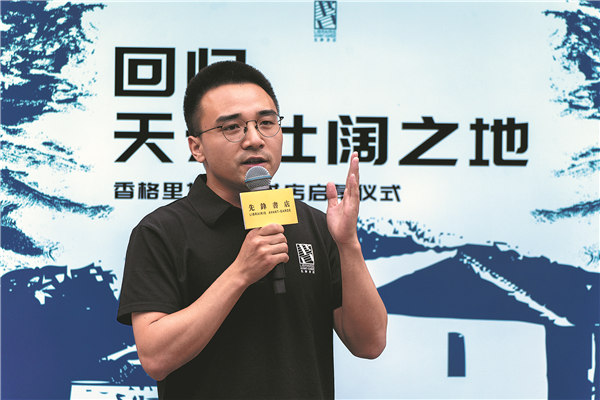

At the cafe, visitors can have a highland barley-flavored latte or yak butter latte.
"The bookstore showcases how distinctive the old houses in Shangri-La are innovatively revitalized and imbued with new content and new appearances with more possibilities for the future," Zhang says.
The Shangri-La branch is the sixth rural bookstore of Librairie Avant-Garde since its first one in Bishan, Anhui province, in 2014.
"We have rural bookstores in the Bai, She and Yi ethnic areas — and now the Tibetan ethnic area," he says.
In Lost Horizon, Hilton describes a library in Shangri-La that has a large collection of books, ancient and modern, domestic and foreign.
"Zhongdian was renamed Shangri-La (based on the introductions in Hilton's work) in 2001, so it must have an idealistic bookstore," Zhang says.
However, building a bookstore in such a remote place is not only symbolic. In the short term, the bookstore, like its many precursors, can boost tourism, the economy and culture.
"Every place has its unique history. What we can do is feature the local forte through our platform so that tourists can see traditional local architecture or learn about the local culture, history and geography through the books we present," Zhang says.
Since its opening, the revenue reached 270,000 yuan in the first month, which "is better than expected", Zhang says, adding that "maybe it's because summer is the peak season for Shangri-La tourism".
In other seasons, especially winter, "business might be sluggish because the altitude naturally prevents many people from visiting, but we will keep going", he says.
In the long run, the bookstore will exert a seminal influence on the residents with books and various cultural events, he says.
"We cannot turn people into book lovers within six months. But over five years, or one or two decades, the residents will see so many people reading and caring about their history and culture, which will not only help increase their incomes but also encourage them to cherish, protect and pass on their culture and be proud of it," Zhang says.
In September, Librairie Avant-Garde will open a Lisu ethnic bookstore in the Grand Canyon of the Nujiang River, on the Gaoligong Mountain bordering Myanmar, duplicating its previous experiences.
Chinese poet Yu Jian, 70, a guest attending the bookstore's opening ceremony, said that he was surprised to see a bookstore in such a "remote" place.
"The bookstore is great but I am wondering how they will survive because there aren't many readers of Mandarin books since most Tibetan people don't understand Mandarin," Yu says.
"However, the bookstore transcends traditional models. It's not about making money. It's more like a 'temple' inspiring people's respect for books and bookstores."